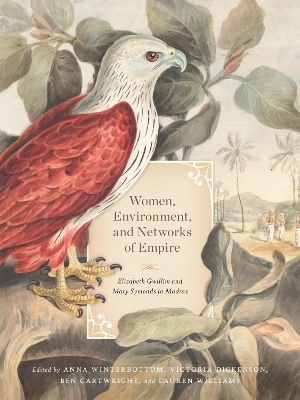
Women, Environment, and Networks of Empire
Elizabeth Gwillim and Mary Symonds in Madras
Seiten
2023
McGill-Queen's University Press (Verlag)
978-0-2280-1886-5 (ISBN)
McGill-Queen's University Press (Verlag)
978-0-2280-1886-5 (ISBN)
Women, Environment, and Networks of Empire is the first detailed study of the art and correspondence of Elizabeth Gwillim and her sister Mary Symonds in South India. The book explores what their work reveals about natural history, the natural environment, colonialism, and women’s lives at the turn of the nineteenth century.
Elizabeth Gwillim (1763–1807) and her sister Mary Symonds (1772–1854) produced over two hundred watercolours depicting birds, fish, flowers, people, and landscapes around Madras (now Chennai). The sisters’ detailed letters fill four large volumes in the British Library; their artwork is in the Blacker Wood Natural History Collection of McGill University Library in Canada and in the South Asia Collection in Britain. The first book about their work and lives, Women, Environment, and Networks of Empire asks what these materials reveal about nature, society, and environment in early nineteenth-century South India.
Gwillim and Symonds left for India in 1801, following the appointment of Elizabeth’s husband, Henry Gwillim, to the Supreme Court of Madras. Their paintings document, on one hand, the rapidly expanding colonial city of Madras and its population and, on the other, the natural environment and wildlife of the city. Gwillim’s paintings of birds are remarkable for their detail, naturalism, and accuracy. In their studies of natural history, Gwillim and Symonds relied on the expertise of Indian bird-catchers, fishermen, physicians, artists, and translators, contributing to a unique intersection of European and Asian natural knowledge. The sisters’ extensive correspondence demonstrates how women shaped networks of trade and scholarship through exchanges of plants, books, textiles, and foods.
In Women, Environment, and Networks of Empire an interdisciplinary group of scholars use the paintings and writings of Elizabeth Gwillim and Mary Symonds to explore natural history, the changing environment, colonialism, and women’s lives at the turn of the nineteenth century.
Elizabeth Gwillim (1763–1807) and her sister Mary Symonds (1772–1854) produced over two hundred watercolours depicting birds, fish, flowers, people, and landscapes around Madras (now Chennai). The sisters’ detailed letters fill four large volumes in the British Library; their artwork is in the Blacker Wood Natural History Collection of McGill University Library in Canada and in the South Asia Collection in Britain. The first book about their work and lives, Women, Environment, and Networks of Empire asks what these materials reveal about nature, society, and environment in early nineteenth-century South India.
Gwillim and Symonds left for India in 1801, following the appointment of Elizabeth’s husband, Henry Gwillim, to the Supreme Court of Madras. Their paintings document, on one hand, the rapidly expanding colonial city of Madras and its population and, on the other, the natural environment and wildlife of the city. Gwillim’s paintings of birds are remarkable for their detail, naturalism, and accuracy. In their studies of natural history, Gwillim and Symonds relied on the expertise of Indian bird-catchers, fishermen, physicians, artists, and translators, contributing to a unique intersection of European and Asian natural knowledge. The sisters’ extensive correspondence demonstrates how women shaped networks of trade and scholarship through exchanges of plants, books, textiles, and foods.
In Women, Environment, and Networks of Empire an interdisciplinary group of scholars use the paintings and writings of Elizabeth Gwillim and Mary Symonds to explore natural history, the changing environment, colonialism, and women’s lives at the turn of the nineteenth century.
Anna Winterbottom is a research associate at McGill University. Victoria Dickenson is professor of practice at McGill University. Ben Cartwright is a writer and former curator at the South Asia Collection in Norwich, UK. Lauren Williams is liaison librarian at the Blacker Wood Natural History Collection.
| Erscheinungsdatum | 28.11.2023 |
|---|---|
| Zusatzinfo | 103 illustrations, 2 tables, 2 colour inserts |
| Verlagsort | Montreal |
| Sprache | englisch |
| Maße | 191 x 254 mm |
| Themenwelt | Kunst / Musik / Theater ► Kunstgeschichte / Kunststile |
| Kunst / Musik / Theater ► Malerei / Plastik | |
| Geschichte ► Teilgebiete der Geschichte ► Kulturgeschichte | |
| Sozialwissenschaften ► Soziologie ► Gender Studies | |
| ISBN-10 | 0-2280-1886-2 / 0228018862 |
| ISBN-13 | 978-0-2280-1886-5 / 9780228018865 |
| Zustand | Neuware |
| Informationen gemäß Produktsicherheitsverordnung (GPSR) | |
| Haben Sie eine Frage zum Produkt? |
Mehr entdecken
aus dem Bereich
aus dem Bereich
der stille Abschied vom bäuerlichen Leben in Deutschland
Buch | Hardcover (2023)
C.H.Beck (Verlag)
CHF 32,15
vom Mittelalter bis zur Gegenwart
Buch | Softcover (2024)
C.H.Beck (Verlag)
CHF 16,80


